A hurricane is a big deal. There’s a lot going on in the aftermath, and you may not be able to count on reliable electric power or navigable roadways in your area. The last thing you want to worry about right now is your taxes. And the government agrees! The Internal Revenue Service along with the Departments of Revenue from multiple states are issuing relief.
How does a major disaster affect my taxes?
Extended deadlines
If you’re affected by Hurricane Debby and live or primarily operate from certain counties in Florida, Georgia, North Carolina and/or South Carolina, relief is available to you for your Federal income tax return and potentially your state income tax return too.
What if…?
If you were impacted by a storm, you might have a bunch of questions on how you can deduct items related to it. Our article, How does a hurricane impact my taxes?, walks through the following questions (and more):
- Can I deduct lost revenue? Unfortunately, you can’t.
- Is the insurance check I get taxed? Yes, but you also get to write off the damaged items and costs to spent out of that money, so it really only is taxed if you spent less than you received.
- What if my stuff was damaged? Usually you can write it off if you haven’t already fully depreciated or written it off. You can’t take a write off for more than the item originally cost.
Other relief
The extended deadlines aren’t the only disaster-related help taxpayers will be receiving. Any personal property damages caused by the hurricane (that aren’t already covered under insurance) can be written off as casualty losses on your tax returns. Other miscellaneous support and relief will also be available.
Do penalties and interest keep accruing?
That depends. In most circumstances, payments were due prior to the storm, which means penalties and interest will continue to accrue until those payments are made. The return deadlines are the only thing that will be extended.
If a payment deadline happens during the storm, each tax authority will handle those differently. Typically however the payment deadline along with the filing deadline will be extended to give you more time.
How much will this delay tax returns from getting filed?
That depends on your tax return preparer, where they are located and where you and/or your business is located.
If you’re a client of DiMercurio Advisors, while we are in a disaster area our operations and team members were not impacted, thus we’re taking the stance that all returns will be filed by the appropriate deadlines unless your business actually was impacted by the storm.
Am I affected by this ruling?
The disaster area covered by the major disaster declaration is pretty simple. If you live and/or primarily operate your business from certain counties in Florida, Georgia, South Carolina or North Carolina, relief could be available for you both from the Internal Revenue Service and the State Department of Revenue.
If your tax return preparer is located within a disaster area, your returns are typically extended as well (even if you DO NOT live and/or primarily operate you business from the declared disaster area). Ultimately, your tax return preparer might still require you to file your returns by a certain date though to ensure they are able to handle all of their clients.
Internal Revenue Service
What are the extended deadlines?
- A qualified entity (defined below) that has a valid extension on file, will now have until February 3rd to file their tax return. No relief is granted for penalties or interest as the deadline for payment was earlier in the year before the hurricane.
- Estimated tax payments due on September 16, 2024 and January 15, 2025 are now due on February 3rd.
Who qualifies?
All businesses, individual and tax-exempt entities that lived in or primarily operated in one of the following areas:
- All 46 counties in South Carolina.
- The following 61 counties in Florida: Alachua, Baker, Bay, Bradford, Brevard, Calhoun, Charlotte, Citrus, Clay, Collier, Columbia, DeSoto, Dixie, Duval, Escambia, Flagler, Franklin, Gadsden, Gilchrist, Glades, Gulf, Hamilton, Hardee, Hendry, Hernando, Highlands, Hillsborough, Holmes, Jackson, Jefferson, Lafayette, Lake, Lee, Leon, Levy, Liberty, Madison, Manatee, Marion, Monroe, Nassau, Okaloosa, Okeechobee, Orange, Osceola, Pasco, Pinellas, Polk, Putnam, Santa Rosa, Sarasota, Seminole, St. Johns, Sumter, Suwannee, Taylor, Union, Volusia, Walton, Wakulla and Washington.
- The following 55 counties in Georgia: Appling, Atkinson, Bacon, Ben Hill, Berrien, Brantley, Brooks, Bryan, Bulloch, Burke, Camden, Candler, Charlton, Chatham, Clinch, Coffee, Colquitt, Cook, Crisp, Decatur, Dodge, Echols, Effingham, Emanuel, Evans, Glynn, Grady, Irwin, Jeff Davis, Jefferson, Jenkins, Johnson, Lanier, Laurens, Liberty, Long, Lowndes, McIntosh, Mitchell, Montgomery, Pierce, Richmond, Screven, Tattnall, Telfair, Thomas, Tift, Toombs, Treutlen, Turner, Ware, Wayne, Wheeler, Wilcox and Worth.
- The following 66 counties in North Carolina: Alamance, Anson, Beaufort, Bertie, Bladen , Brunswick, Camden, Carteret, Caswell, Chatham, Chowan, Columbus, Craven, Cumberland, Currituck, Dare, Davie, Davidson, Duplin, Durham, Edgecombe, Forsyth, Franklin, Gates, Granville, Greene, Guilford, Halifax, Harnett, Hertford, Hoke, Hyde, Johnston, Jones, Lee, Lenoir, Martin, Montgomery, Moore, Nash, New Hanover, Northampton, Onslow, Orange, Pamlico, Pasquotank, Pender, Perquimans, Person, Pitt, Randolph, Richmond, Robeson, Rockingham, Sampson, Scotland, Stokes, Surry, Tyrrell, Vance, Wake, Warren, Washington, Wayne, Wilson and Yadkin.
Where can I find additional information?
IR-2024-205 issued by the Internal Revenue Service on August 9, 2025 contains additional information and details.
Florida / Florida Department of Revenue
The Florida Department of Revenue has stated the following:
- Corporate entities (typically an entity filing a Form 1120 at the federal level) with original or extended due dates between August 1, 2024 and February 18, 2025 are now due on February 18, 2024.
- Corporate entities that qualify are those that are primarily doing business in one of these Florida counties: Alachua, Baker, Bay, Bradford, Brevard, Calhoun, Charlotte, Citrus, Clay, Collier, Columbia, DeSoto, Dixie, Duval, Escambia, Flagler, Franklin, Gadsden, Gilchrist, Glades, Gulf, Hamilton, Hardee, Hendry, Hernando, Highlands, Hillsborough, Holmes, Jackson, Jefferson, Lafayette, Lake, Lee, Leon, Levy, Liberty, Madison, Manatee, Marion, Monroe, Nassau, Okaloosa, Okeechobee, Orange, Osceola, Pasco, Pinellas, Polk, Putnam, Santa Rosa, Sarasota, Seminole, St. Johns, Sumter, Suwannee, Taylor, Union, Volusia, Walton, Wakulla and Washington
- Additional information can be found in the General Tax section of the Florida Department of Revenue website.
Georgia / Georgia Department of Revenue
As of this post, the Georgia Department of Revenue has not made any announcements on tax relief. We suspect the state will conform to the Internal Revenue Service announcement. We’ll continue to monitor the situation and update this article as needed.
North Carolina / North Carolina Department of Revenue
As of this post, the North Carolina Department of Revenue has not made any announcements on tax relief. We suspect the state will conform to the Internal Revenue Service announcement. We’ll continue to monitor the situation and update this article as needed.
South Carolina / South Carolina Department of Revenue
As of this post, the South Carolina Department of Revenue has not made any announcements on tax relief. We suspect the state will conform to the Internal Revenue Service announcement. We’ll continue to monitor the situation and update this article as needed.
Wait, I have more questions!
Tax returns and hurricanes can both be complicated to navigate, and the combination of the two might be overwhelming to think about.
If you’re already working with DiMercurio Advisors and you have questions about your tax returns, reach out to your tax lead on our team and we’ll be more than happy to help.
If you’re not a client, but also you have questions about how the hurricane will impact your taxes, schedule a call with a member of our team below!







